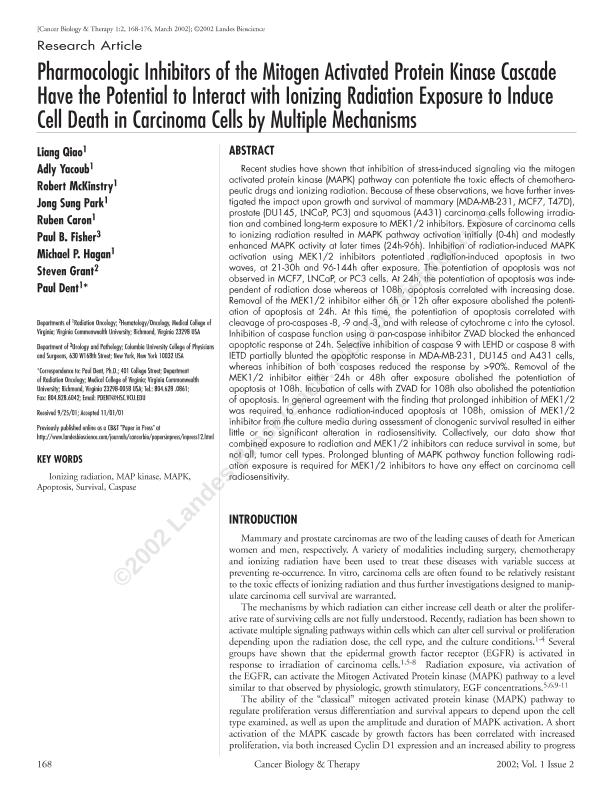Artículo
Pharmocologic inhibitors of the mitogen activated protein kinase cascade have the potential to interact with ionizing radiation exposure to induce cell death in carcinoma cells by multiple mechanisms
Qiao, Liang; Yacoub, Adly; McKinstry, Robert; Park, Jong Sung; Caron, Ruben Walter ; Fisher, Paul B.; Hagan, Michael P.; Grant, Steven; Dent, Paul
; Fisher, Paul B.; Hagan, Michael P.; Grant, Steven; Dent, Paul
 ; Fisher, Paul B.; Hagan, Michael P.; Grant, Steven; Dent, Paul
; Fisher, Paul B.; Hagan, Michael P.; Grant, Steven; Dent, Paul
Fecha de publicación:
12/2002
Editorial:
Taylor & Francis
Revista:
Cancer Biology & Therapy
ISSN:
1538-4047
e-ISSN:
1555-8576
Idioma:
Inglés
Tipo de recurso:
Artículo publicado
Clasificación temática:
Resumen
Recent studies have shown that inhibition of stress-induced signaling via the mitogen activated protein kinase (MAPK) pathway can potentiate the toxic effects of chemotherapeutic drugs and ionizing radiation. Because of these observations, we have further investigated the impact upon growth and survival of mammary (MDA-MB-231, MCF7, T47D), prostate (DU145, LNCaP, PC3) and squamous (A431) carcinoma cells following irradiation and combined long-term exposure to MEK1/2 inhibitors. Exposure of carcinoma cells to ionizing radiation resulted in MAPK pathway activation initially (0-4h) and modestly enhanced MAPK activity at later times (24h-96h). Inhibition of radiation-induced MAPK activation using MEK1/2 inhibitors potentiated radiation-induced apoptosis in two waves, at 21-30h and 96-144h after exposure. The potentiation of apoptosis was not observed in MCF7, LNCaP, or PC3 cells. At 24h, the potentiation of apoptosis was independent of radiation dose whereas at 108h, apoptosis correlated with increasing dose. Removal of the MEK1/2 inhibitor either 6h or 12h after exposure abolished the potentiation of apoptosis at 24h. At this time, the potentiation of apoptosis correlated with cleavage of pro-caspases -8, -9 and -3, and with release of cytochrome c into the cytosol. Inhibition of caspase function using a pan-caspase inhibitor ZVAD blocked the enhanced apoptotic response at 24h. Selective inhibition of caspase 9 with LEHD or caspase 8 with IETD partially blunted the apoptotic response in MDA-MB-231, DU145 and A431 cells, whereas inhibition of both caspases reduced the response by >90%. Removal of the MEK1/2 inhibitor either 24h or 48h after exposure abolished the potentiation of apoptosis at 108h. Incubation of cells with ZVAD for 108h also abolished the potentiation of apoptosis. In general agreement with the finding that prolonged inhibition of MEK1/2 was required to enhance radiation-induced apoptosis at 108h, omission of MEK1/2 inhibitor from the culture media during assessment of clonogenic survival resulted in either little or no significant alteration in radiosensitivity. Collectively, our data show that combined exposure to radiation and MEK1/2 inhibitors can reduce survival in some, but not all, tumor cell types. Prolonged blunting of MAPK pathway function following radiation exposure is required for MEK1/2 inhibitors to have any effect on carcinoma cell radiosensitivity.
Palabras clave:
APOPTOSIS
,
CASPASE
,
IONIZING RADIATION
,
MAP KINASE
,
MAPK
,
SURVIVAL
Archivos asociados
Licencia
Identificadores
Colecciones
Articulos(IMBECU)
Articulos de INST. DE MEDICINA Y BIO. EXP. DE CUYO
Articulos de INST. DE MEDICINA Y BIO. EXP. DE CUYO
Citación
Qiao, Liang; Yacoub, Adly; McKinstry, Robert; Park, Jong Sung; Caron, Ruben Walter; et al.; Pharmocologic inhibitors of the mitogen activated protein kinase cascade have the potential to interact with ionizing radiation exposure to induce cell death in carcinoma cells by multiple mechanisms; Taylor & Francis; Cancer Biology & Therapy; 1; 2; 12-2002; 168-176
Compartir
Altmétricas



